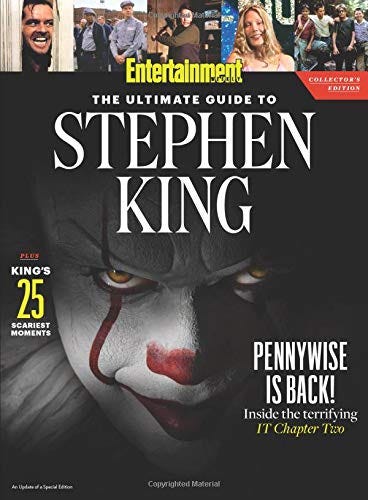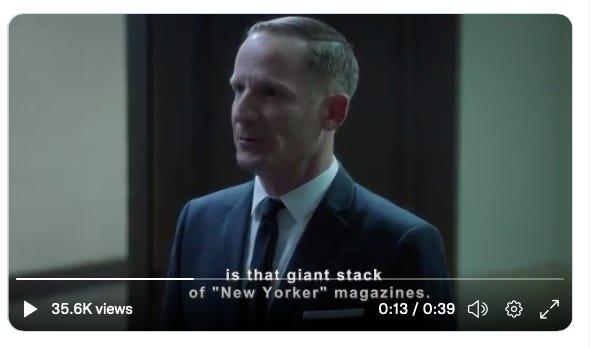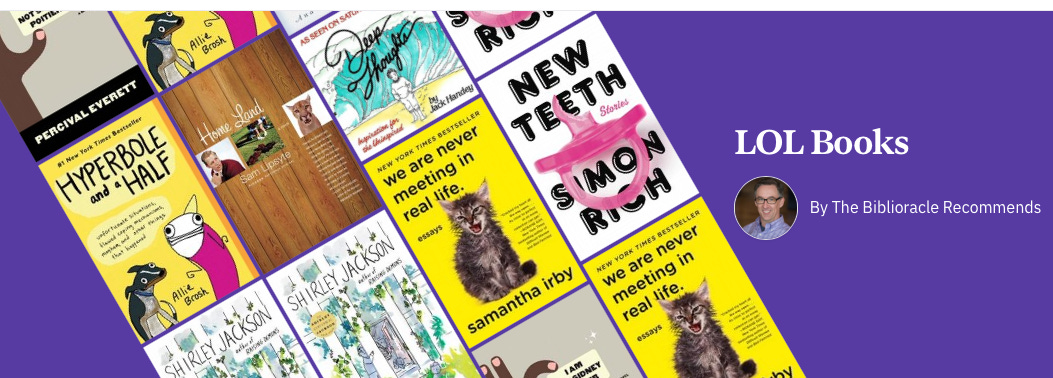Perhaps you saw this week that the magazines InStyle and Entertainment Weekly will be ceasing publication.
InStyle I never understood. It was like 60% ads, or maybe I’m exaggerating because the ads were virtually indistinguishable from the editorial content. Back in the day, when I was stuck in a waiting room pawing through the years-old periodicals, InStyle was at the bottom of my selection list, behind even Highlights for Children. I’d rather know what Goofus and Gallant are up to than how Zoey Deschanel wrestled over the paint colors for her powder room.
Entertainment Weekly, however, spent a good decade as my favorite magazine, right up there with the heyday of Sports Illustrated. It seemed like the weeklies always arrived on Thursdays, EW, SI, and the New Yorker, and after carefully parsing all of the intellectually nourishing content the New Yorker had for me, I’d pick up my Entertainment Weekly next.
Kidding! Entertainment Weekly was always up first. The New Yorker would go on the giant pile of its unread brethren where it would silently mock me.
(In its final season, The Good Place, had one of my favorite jokes in recent memory riffing on the problem of unread New Yorker magazines. Check it out here.)
I saw Entertainment Weekly as essentially People magazine without the boring human interest stories about unfamous people who did things like knit cozies for pumpkins. It understood that the only interesting humans are famous and we want to know what they’re up to in their capacities of making the stuff that makes them famous far more than we care about say…our neighbors.
At the same time, unlike Us magazine, which was 90% pictures and captions with only the mildest of gossip - “Tommy Lee and Pam out for ice cream on a hot day!” - Entertainment Weekly had actual substantive entertainment-related news and content.
That very much included the book section, which was helmed from the outset by Tina Jordan, who currently serves as deputy editor of the New York Times Book Review.
I had a ritual when my copy arrived, paging through without reading anything too closely, getting a sense for what was covered that week, building some anticipation for the deeper dives I would soon get to take. But once I got to the book section - tucked into the back, because as entertainment, books will always rank behind film, television, and music - I would read every word.
Each issue usually had a lead review of some substance followed by maybe four or five capsule reviews, each with a grade of A through F at the end. I loved that it took books as entertainment seriously. The magazine covered a wide array of titles, and by no means shied away from literary fiction, but when talking about literary fiction, did so in a way that assumed the same people who came to the magazine to check out the summer movie preview would also be interested in what Don Delillo or Margaret Atwood were up to.
In hindsight, I can see how a lot of my own attitude around public writing about books was shaped by Entertainment Weekly’s approach. Books should be fun.
Reading is entertaining!
Don’t get me wrong, I love a good substantive critical essay written by people much smarter and better read than me, but as great and vital as that writing is, it is not enough to sustain the full reading ecosystem. Entertainment Weekly filled a niche of treating serious books as popular entertainment better than anyone.
Laments over the dearth of quality substantive book criticism are common, and I feel that lack very personally, considering my column debuted at the Chicago Tribune as part of a 24-page stand-alone book section that no longer exists. But that criticism continues to live at publications like BookForum, N+1, LitHub, and elsewhere. Even as a pretty dedicated reader of those places, I have a hard time keeping up with all of it. This kind of criticism has always been and will always be a niche product, a niche that I hope thrives forever, but it will never be more than a niche.
But places that take the popular seriously and write about the serious assuming it could be popular have become far scarcer, particularly when it comes to books. As the popularity and potency of Entertainment Weekly faded, Oprah’s O Magazine became my favorite mass audience book coverage, but even Oprah cannot stem the tide of the death of print, downsizing her monthly to quarterly last year.
There are online spaces that have arisen for book lovers - Book Riot for example - but because of the nature of the internet, they too become niche publications primarily preaching to the choir. Nothing wrong with that at all (it’s what I do here), but there is something lost when folks that come to a publication to know what Brad Pitt is up to, aren’t also exposed to what’s happening in books.
In a lot of ways, Entertainment Weekly anticipated the kind of coverage that would come to define content on the internet, with their big seasonal previews, end-of-year best of lists, and deep dives into single subjects like a ranking of every episode of Buffy the Vampire Slayer, or the best romantic comedies of all-time.
But because the internet can deliver all this content instantly and gives us social media channels on which we can argue about it, and because we can access it anywhere, any time, there is no future for a magazine like Entertainment Weekly.
As much as this newsletter might make it seem otherwise, I am rather anti-nostalgia. I do not spend a lot of time wishing to turn back the clock to other times, and would much rather look forward to what good stuff can be built in the future. However, doing that does require appreciating what made the good stuff vital, and I think there’s much to learn from what Entertainment Weekly did so well for so long.
Links
My Chicago Tribune column the week of my glorious vacation to Costa Rica where lots of people are vaccinated and the climate allows you to eat outside was about my foray into book TikTok (#BookTok) where I learned that there’s some fun stuff happening, even though I don’t fully understand it.
My Chicago Tribune column this week is about books that are actually laugh out loud funny. To see the books you can either check out the column or go to my mini-shop at Bookshop.org, where affiliate income for any purchases will go to Open Books.
Over at LitHub they have a list of winter-themed books which they say will help you get through the last cold days of the season.
If you’re concerned about book bans in your community, (also known as censorship attacks), the Author’s Guild has put together an action plan with practical guidance for resistance.
E! Online has “15 Books to Fall in Love With This February.”
If you want to see how books can reveal that a couple should divorce, check out the screenshots from this tweet by Amber Sparks, author of And I Do Not Forgive You.
Margaret Wise Brown, the author of all-time classic Goodnight Moon was more fascinating than you can possibly imagine.
We just passed the 100th anniversary of James Joyce’s Ulysses. A nice, accessible way to experience it is this fully-dramatized production of the text, almost 30 hours in duration, and parsed out in easily digestible podcast chapters, including summaries of the action to orient you in the text.
Recommendations
All books linked below and above are part of The Biblioracle Recommends bookshop at Bookshop.org. Affiliate income for purchases through the bookshop goes to Open Books in Chicago.
Affiliate income edges up to $29.80. Remember that I’ll match any total up to 5% of the annualized revenue for the newsletter or $500, whichever is larger, as a donation to Open Books.
The list of 2022 recommendations will be filling up week by week.
Recommendations are always open. Send in your requests by clicking below and following the instructions.
1. The Days of Afrekete by Asali Solomon
2. The Uninvited Guests by Sadie Jones
3. The Exiles by Christina Baker Kline
4. A Dark-Adapted Eye by Ruth Rendell
5. Books for Living by Will Schwalbe
Valerie W. - Downers Grove, IL
For Valerie a title I try to get on my list of recommended books every year because it’s one that I want to see circulating among readers, even though it’s from a few years back and never made a huge splash: The incredibly powerful Miles from Nowhere by Nami Mun.
1. The Scout Mindset by Julia Galef
2. T: The Story of Testosterone, the Hormone that Dominates and Divides Us by Carole Hooven
3. The Genetic Lottery by Kathryn Paige Harden
4. Free Will by Sam Harris
5. Innate: How the Wiring of Our Brain Shapes Who We Are by Kevin J Mitchell
Kennedy N. - London, UK
Kennedy has been doing some heavy reading in the so-called “rationalist” community, a movement which interests me, but also with which I personally have a few questions. I’m hoping he hasn’t yet read Daniel Dennett’s Elbow Room: The Varieties of Free Will Worth Wanting, because it provides an interesting counterpoint to the someone like Sam Harris, suggesting a “compatibilist” framework that can exist inside a deterministic universe. I could go on and on about this stuff myself, but I’m going to stop typing now before I do.
Paid subscription update
Annualized revenue for this newsletter currently stands at $11,371. If it reaches $12,500 I can afford to start paying outside contributors and offer more book-related content that has fun while taking books seriously. If that sounds good to you, please subscribe.
Vacation is great, but very pleased to be back in the world, sending this missive to such fine folks as you. Enjoy whatever the world holds for you in the week ahead.
John
The Biblioracle







I devoured this magazine each week for many many years. The writing was smart and they were often spot on with their music, movie, and book recommendations. It's been sad to watch the numerous changes happen over the years, as it clearly struggled. More Marvel covers, shorter articles, less groundbreaking recommendations, as clearly a more commercial voice took hold. Ah, the death knoll was hard to ignore. Thanks for the reminder that this magazine was a big part of curriating my past and current joys.
Apparently I'm not the only one with a continually growing stack of New Yorkers.